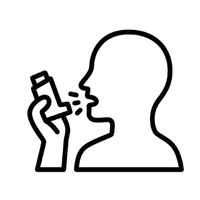
Asthma is a health problem that affects the lungs. It is commonly referred to as a "breathing problem" or "chronic wheezing". It makes the airways narrow, swollen, and filled with mucus. This causes coughing, chest tightness, and breathing trouble.
People often just call it "asthma" or describe it as "having attacks of breathlessness or wheezing." These asthma attacks can include symptoms like tightness in the chest, coughing, wheezing, and shortness of breath, which can range from mild to life-threatening.
Doctors call it bronchial asthma. It can start in childhood or later. Some people have mild asthma. Others may face strong attacks. Treatment usually involves inhalers, devices that deliver medicine straight to the lungs. Reliever inhalers quickly ease symptoms during an attack, while preventer inhalers reduce inflammation and help prevent future attacks.
A common misconception is that asthma is only a childhood disease or not serious, but adults can also develop it, and severe asthma can be life-threatening if not managed properly. Another myth is that people with asthma should avoid exercise; in truth, with proper treatment and control, most people with asthma can lead active, normal lives.
Asthma is long-term, but it can be managed. With the right care, many people live normal lives. Regular check-ups and early intervention make a big difference in keeping asthma under control.
This information is general and not a substitute for medical advice. Always consult a doctor for diagnosis and a personalised treatment plan.
People need asthma treatment to keep their airways open and to breathe easily. Asthma cannot be cured, but treatment helps control symptoms, prevent attacks, and reduce hospital visits.
Treatment helps with:
Without treatment, asthma can get worse and lead to serious breathing problems.
Treatment needs vary by patient. A healthcare professional should confirm your diagnosis and advise the right medicines and inhalers.
Asthma happens when the lungs react too strongly to certain things. These things are called triggers. The airways swell up, tighten, and produce extra mucus. This makes it hard to breathe.
Main causes of asthma:
Not everyone has the same triggers. A doctor can help find what causes your asthma and how to avoid it.
Asthma symptoms can come and go. Some people feel fine for days, then suddenly have trouble breathing. These signs often get worse at night, during exercise, or in cold weather.
Knowing the symptoms early helps prevent serious attacks.
Common symptoms of bronchial asthma:
These symptoms may be mild or strong. If they happen often, the asthma is not under control and needs treatment.
Frequent or worsening symptoms require medical assessment. Speak to your doctor to confirm asthma and receive a tailored management plan.
An asthma attack is when breathing becomes very hard. The airways tighten quickly, and the lungs do not get enough air. This can be dangerous if not treated fast.
Steps to take during an asthma attack:
Follow your personal asthma action plan as prescribed by your doctor. If symptoms are severe or do not improve, seek emergency care immediately.
An inhaler helps send medicine directly into the lungs. It works fast and is the most common way to control asthma. Many people use inhalers daily. Some use them only during attacks. Using the inhaler the right way is important. Wrong use means the medicine won’t reach the lungs properly.
Steps to use an inhaler correctly:
If you use a spacer, connect it to the inhaler and follow your doctor’s instructions. Always keep your inhaler clean and check the expiry date. Carry it with you every day.
Device choice and technique should be reviewed by a clinician. Ask your doctor or nurse to demonstrate and correct your inhaler/spacer use.
When to seek emergency care:
Quick action can save a life. Always keep your inhaler close and make sure family members know what to do.
If any of these signs appear, use your reliever inhaler and seek urgent medical attention or call emergency services without delay.
These symptoms lead to treatment once a doctor confirms that the cause is asthma. If you frequently experience wheezing, breathlessness, chest tightness, or a persistent cough, especially at night or after activity, your doctor may run a few tests. Once asthma is diagnosed, a treatment plan is started to control symptoms and prevent future attacks. Only a qualified clinician can confirm asthma and start treatment. Do not start, stop, or change medicines without medical advice.
Asthma can be tricky to detect, especially in its early stages. If your doctor suspects asthma, they may recommend the following tests:
If you experience any of these symptoms, like wheezing, breathlessness, or a persistent cough, for more than a few weeks, it is important to seek medical advice. Early diagnosis and treatment can help control asthma effectively and prevent serious attacks. If you or your loved ones have these signs, Bangla Health Connect connects you with respiratory specialists at trusted hospitals worldwide for expert care and personalised treatment.
Tests such as spirometry, FeNO, and allergy panels must be ordered and interpreted by healthcare professionals. Avoid self-diagnosis.
.png)
Through Bangla Health Connect, Bangladeshi patients can access leading hospitals across India, Thailand, and other countries that are recognised for advanced respiratory and lung care. Many families travel abroad because of the proven expertise and high success rates available through these trusted medical centres.
Here’s why Bangladeshi patients choose asthma treatment with Bangla Health Connect’s worldwide network of trusted hospitals:
Bangla Health Connect offers Bangladeshi patients a trusted pathway to skilled specialists, affordable treatment, and dependable international care.
Bangla Health Connect connects Bangladeshi patients with trusted hospitals worldwide that offer advanced diagnosis and treatment for asthma. These hospitals are recognised for their expertise in respiratory care, modern diagnostic technology, and personalised management plans for long-term control.








.jpg)

.png)





.jpg)










These hospitals follow global respiratory treatment guidelines and provide complete support for Bangladeshi patients through Bangla Health Connect.
The average cost of asthma treatment ranges from $25 to $350 in India and $70 to $500 in Thailand. The final cost depends on the treatment type, diagnostic tests, and whether emergency hospital care is needed.
Before viewing the detailed tables, it’s helpful to understand the main factors that influence these costs.
Note: India offers affordable and reliable asthma care supported by modern diagnostics, experienced pulmonologists, and widely available inhaler options.
Note: Thailand’s hospitals are known for offering advanced facilities and personalised care packages. Their higher prices reflect the use of imported medicines and premium healthcare standards.
The costs listed are approximate and may differ based on hospital, city, and treatment duration. Consult your healthcare provider for accurate and updated estimates.
The currency conversion rates in the table above are based on data from October 2025.
For more help on cost estimates and personalised guidance, contact Bangla Health Connect.
Asthma can be controlled well with the right treatment. A new study from the University of Plymouth and GSK found that patients using a modern inhaler called Relvar Ellipta had better asthma control than those on regular medicines. After 24 weeks, 7 out of 10 people using this inhaler felt better, compared to just over half of those on usual care. The benefits lasted for almost a year. This shows how using the right inhaler regularly can make a big difference in daily life and reduce serious attacks.
Study findings are informational and not an endorsement of any specific brand or device. Treatment should be chosen by your doctor based on your condition.
In asthma treatment, “success” means:
Leading hospitals worldwide focus on accurate diagnosis, preventive management, and patient education to control asthma effectively. Their care includes:
This approach ensures long-term stability, fewer attacks, and better quality of life for asthma patients.

Dr. Sundararajan, Senior Pulmonologist at Apollo Hospitals, explains the evolving goal of asthma treatment:
“There’s nothing an asthmatic cannot do as long as they take their medications regularly and adopt healthy lifestyle changes. Olympic swimmers, mountain climbers, and professional footballers live with asthma. The goal today is not just to treat asthma, but to help patients achieve a near-normal quality of life.”
This expert opinion is for general awareness and does not replace medical advice. Always follow your treating doctor’s recommendations.
For many Bangladeshi families, travelling abroad for asthma treatment can feel complicated, from finding the right doctor to arranging travel and follow-up care. Bangla Health Connect makes this journey easier by offering complete guidance, coordination, and support every step of the way.
Choosing Bangla Health Connect means getting access to reliable hospitals, expert care, and smooth travel coordination for asthma treatment abroad.
Note: Bangla Health Connect does not provide medical advice.
✅ Share Your Reports - Bangla Health Connect connects you with trusted hospitals worldwide.
✅ Get treatment plans from leading Hospitals worldwide
✅ Choose the one that fits you
✅ Let us handle the rest
Asthma is often caused by a mix of genetic and environmental factors. Common triggers include dust, pollen, smoke, pollution, cold air, or even strong smells. Some people develop asthma due to allergies or frequent chest infections.
Signs include tightness in the chest, wheezing, fast breathing, and trouble speaking in full sentences. In severe cases, the lips or fingers may turn blue. Immediate action with a reliever inhaler is necessary. Follow your doctor’s asthma action plan. If symptoms are severe or persist, seek emergency care.
Asthma cannot be fully cured, but it can be controlled. With proper medication and by avoiding triggers, most people live normal lives. Long-term control is individual. Your doctor will advise the right maintenance plan for you.
Doctors and nurses abroad will show you how to use inhalers properly. Using a spacer and inhaling slowly helps the medicine reach the lungs. You can also request video demonstrations during your consultation. Have your technique checked regularly by a clinician to ensure the medicine reaches your lungs effectively.
Yes. Bangladeshi patients need a medical visa to travel for treatment. Bangla Health Connect helps you get the necessary hospital invitation letters and guides you through the visa application process.
Yes, patients can bring one or two family members as attendants. They can apply for medical attendant visas along with your application.
It depends on your treatment plan. For consultations and routine care, a stay of 5 to 7 days is usually enough. For patients needing advanced treatment or monitoring, the stay may be longer.
Yes. Bangla Health Connect supports you with doctor appointments, visa assistance, cost estimates, travel bookings, and ongoing follow-up during and after treatment.

